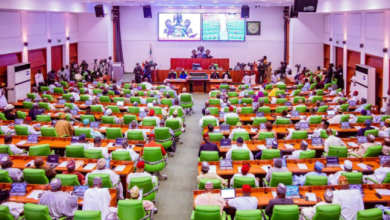Northern Leaders Urge Tinubu to Decline US and French Proposal or Bases in Nigeria

Some eminent northern leaders Friday cautioned against allowing the United States and the French governments to relocate their military bases from the Sahel to Nigeria.
In an open letter to President Bola Tinubu and the leadership of the National Assembly, the leaders said the federal government should not succumb to such pressure.
Those who signed the letter include Professor Abubakar Siddique Mohammed of the Centre for Democratic Development, Research and Training (CEDDERT), Zaria; Professor Kabiru Sulaiman Chafe, a former Minister of State for Petroleum Resources, representing the Arewa Research and Development Project (ARDP), Kaduna; Professor Attahiru Muhammadu Jega, who is a former Chairman of the Independent National Electoral Commission (INEC); Professor Jibrin Ibrahim from the Centre for Democracy and Development (CDD), Abuja; Auwal Musa (Rafsanjani) of the Civil Society Legislative Advocacy Centre (CCISLAC) Abuja; and Y. Z. Ya’u from the Centre for Information Technology and Development (CITAD), Kano.
According to the letter, the American and French governments have allegedly been aggressively lobbying Nigeria, along with other Gulf of Guinea countries, to sign new defence pacts that would allow them to redeploy their troops, expelled from Mali, Burkina Faso and Niger.
The signatories expressed concern that Nigeria, being the most strategically located among the Gulf of Guinea countries, may succumb to this pressure, thereby jeopardising its defence and internal security.
“The recent expulsion of French and American troops from Niger due to their perceived ineffective presence raises questions about the efficacy of hosting foreign military bases”, the citizens said in the open letter.
They also argued that the primary goal of these bases, ostensibly to combat terrorism in the Sahel, has not been achieved, as terrorism has only escalated since those camps were established.
“It is important to clearly state that there are only dangers and no gains from such military operations.
The American operations in Niger Republic, for example, were ostensibly to pre-empt and uproot terrorists from the Sahel region. The result has so far been quite unimpressive if not a complete failure.
“It is apparent that the presence of American troops and other intelligence personnel in Niger Republic is not serving any useful purpose. This is for the simple reason that terrorism, far from abating, has risen dramatically since the US began its operations in the region,” they said.
They also cautioned against compromising Nigeria’s sovereignty and independence for short-term strategic alliances that may have dire long-term consequences. They added that hosting foreign troops often leads to increased prices and living costs in local areas, disproportionately affecting the lower-income population.
“Environmentally, the construction and operation of military bases can lead to significant degradation of the local environment. This includes deforestation, soil erosion, water contamination, and loss of biodiversity, which are detrimental to agricultural communities and indigenous populations. The long-term environmental damage could further hinder economic opportunities and sustainable development,” they said.
The Presidency and the National Assembly have yet to make any public comments on the open letter.






